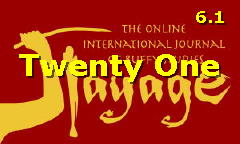

 The Whedonverses and the Sociology of Academe, or A Report on SC2: The Slayage Conference
on the Whedonverses, Gordon College,
May 26-28, 2006
The Whedonverses and the Sociology of Academe, or A Report on SC2: The Slayage Conference
on the Whedonverses, Gordon College,
May 26-28, 2006
Brett M. Rogers, University of Georgia
(1) The events of the weekend of May 26-28, 2006 bode well for scholars of the Whedonverses. Three years after the end of Buffy the Vampire Slayer and the premature demise of Firefly, two years after the cancellation of Angel, and less than one year after the box-office debacle of Serenity, scholars and fans alike were still willing to travel across the globe to discuss the sophisticated texts produced by the indomitable Joss Whedon and his talented ensemble of cast and crew. Moreover, some 210 people were not only willing to travel from all over the globe to attend the Slayage Conference on the Whedonverses (henceforth called “SC2”), but were willing to travel to Gordon College in the quiet hamlet of Barnesville, Georgia (or, as I have heard it called by several fellow Georgia state residents, “Barnes-where?”). As opposed to the first Slayage conference, which took place in 2004 in the tourist-friendly destination of Nashville, Tennessee (and even featured a day trip to Memphis after the conference, adding to the tourist appeal), SC2 required participants to possess a valiant devotion to scholarship on the Whedonverses in order to make the trek. And devoted these attendees were, for SC2 absolutely buzzed with three days of animated lectures and even more animated conversations. SC2 certainly showed that, for the moment, interest in and scholarship on the Whedonverses is alive and well.
(2) SC2 consisted of a variety of talks covering a diverse body of topics including gender, race, mass media, pedagogy, literature, linguistics, anthropology, comparative mythology, philosophy, morality, and more. (For a complete listing of papers delivered at SC2, the conference program is still available online at http://www.slayage.tv/SCW/SC2_Program.htm. See also Patricia Pender’s review in this issue). Some papers were truly outstanding contributions, such as Roz Kaveney’s keynote address and David Kociemba’s riveting paper on media addiction in BtVS; others offered tantalizing hints of scholarly directions to come, especially the many papers exploring the social, economic, and political underpinnings of Firefly and Serenity; and still others were the standard conference fare. Perhaps most intriguing at SC2 – and a new development since Nashville, as far as I can tell – was the small number of papers that were not really academic papers per se, but meditations on the pleasures of the Whedonverses, a kind of intellectual fandom seeking to situate itself in the nebulous space between fan appreciation and the traditional academic conference.
(3) The variety of papers mirrored another intriguing facet of SC2, the visibly large number of undergraduate students, ‘independent scholars,’ and non-professional scholars in attendance. In my native field of classical literature and languages, international academic conferences are primarily occasions for professionals and soon-to-be professionals (i.e., graduate students) to meet, converse, and socialize with one another, expenses usually paid by their home institution; a modest number of local undergraduates usually attend, while the independent scholar is a rara avis, although not totally unheard of. (Regional conferences are a slightly different case, where secondary school educators and undergraduates have somewhat greater visibility.) The conference on the Whedonverses, however, consisted of a quite different crowd: professors coming from a wide array of disciplines, professional cultural critics, graduate students, undergraduates, independent scholars with no affiliation to professional scholarship, and fans of the Whedonverses just there to hear papers. I suspect that there were even one or two high school students in the crowd. Attendees were present not just because professionalism demanded fealty, but because this was a labor of love. This became abundantly clear during a paper presented by Wayne Chandler in the “Genre & Intertextuality” panel. Chandler asked the room how many people could claim on their curriculum vitae that they earned their livelihood from Buffy studies; one lone hand waved in the air.
(4) I rehearse the social composition of the audience at SC2 at length because I believe that this is one of the great strengths of the Slayage conferences. I recall in 2004 that, after I returned home from the first Slayage conference in Nashville to the removed pastures of Stanford University, I remarked to a fellow graduate student that I had perceived a certain degree of “academic egalitarianism” at the conference. SC2 proved no different, similarly offering a view of an academy that supports professionals and non-professionals alike, bringing together minds and voices rarely heard together in the more traditional disciplines of the academy. In both Nashville and Barnesville I had stimulating conversations in and out of the lecture hall with undergraduates, graduate students, high school teachers, community college instructors, college professors, professors from colleges well off the beaten path, foreign administrators, as well as a host of non-professional scholars, including video technicians, comic book store owners, and anonymous fans. While it is increasingly common to see defenses of why Buffy matters – see, for instance, the literary and cultural apologia offered by Rhonda Wilcox in her recent study entitled Why Buffy Matters: the Art of Buffy the Vampire Slayer (2005) – the Slayage conferences organized by Wilcox and David Lavery have implicitly addressed the question “Why does studying Buffy matter?” There really is something important at stake here – pun only slightly intended – as the mixed social composition of the Slayage conferences offers a stunning vision of what the academy could be when we move beyond the social order repeatedly affirmed in traditional academic discourse.
(5) There are several factors that might account for the Slayage conferences’ ‘academic egalitarianism.’ From a purely pragmatic perspective, although the field of Buffy studies is increasingly growing (for which, see Wilcox’s article in this issue), it is still a young enough field in need of as many voices and insights as possible if it is even to survive until it might develop its own distinctive voice and find a permanent home in academic syllabi. Moreover, just as fans of Buffy the Vampire Slayer, Angel, and Firefly have generally forged quite hospitable communities – no doubt having learned the virtues of idiosyncratic, self-made communities from the shows themselves, as many papers at SC2 pointed out – so too have the organizers and attendees made great efforts to invite everyone into the conversation. It is clear that these communities are shifting and still very much in the process of formation, not yet plagued by the discrimination, academic genealogies, and rivalries that lurk in other fields. It is perhaps an interesting coincidence (or corollary?) that neither SC1 nor SC2 included many papers given by faculty and students from ‘elite’ research universities. Whether this merely reminds us of the generally conservative nature of academic discourse, or hints that change must come from the fringes of society, or suggests some different tertium quid altogether, I leave open to discussion.
(6) I mention so-called ‘elite’ research universities because this is also forms part of the problem faced by scholarship on the Whedonverses. Some scholarship is simply outstanding; I need only point to Michael Adam’s Slayer Slang (2003), as well as his stimulating keynote address at SC2 on the ‘clipping’ of phrasal verbs in BtVS, or to the high quality of many articles that have appeared in journals and edited collections over the last seven years (again, see Wilcox in this issue). As I said above, SC2 featured many excellent, very good, or pleasantly stimulating talks. However, many of the papers at SC2 did not attain such a quality of research, taking on the appearance of fan rants as it were, and I, among a number of other individuals with whom I spoke during the conference, found myself frustrated on more than one occasion. Many papers failed to answer what I consider the two fundamental questions of every good paper, article, and book: (1) “What’s the thesis?” and (2) “What’s the pay-off?” or, to put it in Buffy-speak, “Where do we go from here?” (This, of course, is not a feature exclusive to SC2 but to more conferences than I care to count.) If scholars of the Whedonverses do indeed desire to attract the attention of and find a more permanent place in the ‘Ivory Tower,’ I suspect that the Slayage conferences will have to show greater selectivity in the papers that are presented or express more rigorous standards. Of course, that could compromise or even seriously jeopardize the admirable ‘academic egalitarianism’ I identified a moment ago; however, by virtue of its content and the passion of Buffy, Angel, and Firefly fans, so-called ‘Whedonian studies’ has an unique opportunity not just to get non-academics excited about scholarship, but also to model critical integrity and educate audiences in the value of such methodologies. In turn, I should hasten to add, professional academics have much to learn from some of the non-professional scholars; at both Nashville and Barnesville some of the best talks came not from professional academics but from non-professional critics who possessed a clarity found too rarely in academe.
(7) In the end, SC2 was a great success, simultaneously informative, stimulating, and full of potential. After all, where else can a discussion of the complexities of intratextuality in BtVS or the alternate vision of capitalism offered on Firefly be coupled with passionate disputes about the hotly contested ‘Angel vs. Spike’ question. All this attests to the verve and value of SC2. Nevertheless, I cannot help but wonder what would happen if SC3 were to take place in a more publicly visible locale, in New York, Chicago, San Francisco, or Los Angeles. Could the Slayage conference attract more curious academics to enter and explore the field? Could studies of the Whedonverses continue to change the way fans think about scholarship and academic conferences? Could studies of the Whedonverses let us forge a new vision of the scholarly community? Only SC3 will tell.